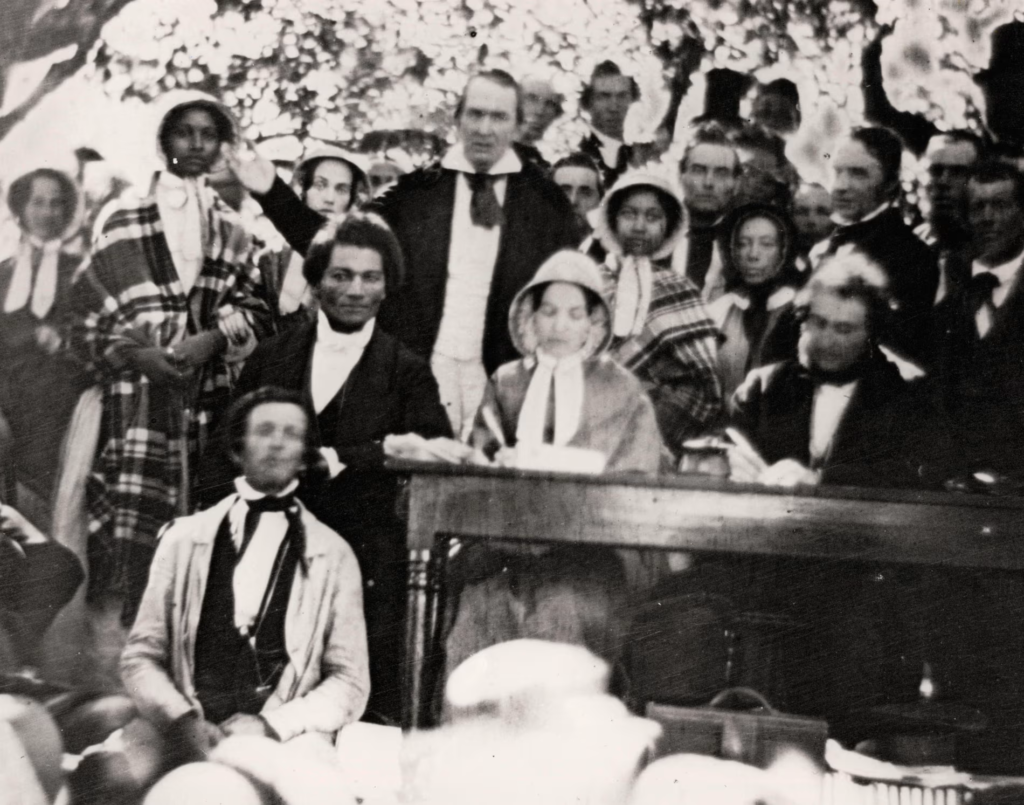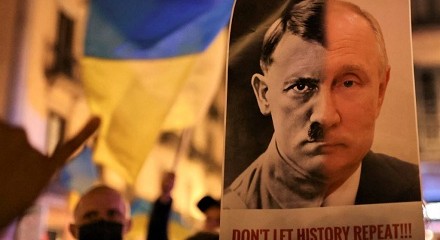Hmm [none/use name]
- 15 Posts
- 90 Comments
I think this article I shared earlier in the week on /c/history is a pretty good piece to send to people, especially those at least sympathetic towards socialism. It outlines how the abolitionists actually managed to achieve lasting change in the United States, despite its 2 party system and powerful slave-owning aristocracy.
Basically it lays out what was done by the abolitionists to achieve a better world. That could help us start a serious discussion on what is to be done in our time.
The Abolitionist Dirty Break by Ben Grove
From the introduction of the piece:
How can a small movement challenge the Leviathan? How can it find strength in its independence? How can it topple a power that seems omnipotent and achieve a revolution?
In 2024, these tasks may seem hopelessly difficult to socialists in the United States. But defying the powerful has never been easy, and we will always have lessons to learn from our predecessors. One of the most important, yet also misunderstood, is the American abolitionist movement.
It’s easy enough to celebrate abolitionists for their righteous principles: activists of every stripe invoke their legacy. Yet abolitionists and their Radical Republican allies were more than just moral idealists. They were also cunning revolutionary strategists. Using principled independent politics, they successfully attacked America’s slaveholding oligarchy and the two-party system that protected it. Their insights and debates have tremendous relevance for modern socialists, because abolitionism helped to ignite the most important revolutionary rupture in U.S. history: the Civil War and the downfall of chattel slavery.
And these were the conditions that their movement built itself in:
By the 1820s, a two-party system of Whigs and Democrats was developing, nurtured by the brilliant New York politician Martin Van Buren. Van Buren’s explicit goal was to use the excitement of party politics to distract the masses from more dangerous conflicts over slavery. Whigs and Democrats would have fiery conflict and genuine power struggles—but both sides suppressed opposition to America’s true ruling class: the planters of the South, the Slave Power.
Haven't gotten around to trying to really read this article in full but it looks like you've got a pretty serious misquote.
That last paragraph you quote, which is at the end of the article, is followed by a single sentence given its own paragraph. So it actually reads as follows:
The promise of an end to the drama might be enough to elect Kamala. I want it to be true.
But it is a lie.
Emphasis mine.
So he's not saying it'll actually happen. Of all things he's rejecting the "40k Ork logic" that you're trying to pin on him. It sounds more like he's lamenting that 'If Democrats weren't lying, maybe Kamala Harris winning would lead to better circumstances, but they are lying.'
Cutrone has had some completely garbage takes (e.g. Palestine) but we don't need to stoop to the level of misreading him so carelessly. That benefits no one.

Why do people on this site keep saying, without checking, that there are no resources available whatsoever to help people get out of evac zones? Making claims like this without checking first could get people fucking killed. Do better.
There are government resources available to help people evacuate. I actually made a thread that lists some resources including for the county that Tampa is part of: https://hexbear.net/post/3632288
- Hmm [none/use name]to
 ·3 months ago
·3 months agoFor those who may be in need of it, I made a thread that includes info for using public transit to get to storm shelters: https://hexbear.net/post/3632288
- Hmm [none/use name]to
 ·3 months ago
·3 months agoThey literally have made busses available to get people to shelters before the storm: https://hexbear.net/post/3632288
- Hmm [none/use name]to
 ·3 months ago
·3 months agoThere are resources being made available to help people get to safety ahead of the storm: https://hexbear.net/post/3632288
- Hmm [none/use name]to
 ·3 months ago
·3 months agoTo be clear I'm not singling out this comment by replying to it. A lot of other ones in this thread are saying similar things. This one is just near the top right now so I'm replying to it for visibility.
I don't want anyone in the area getting killed because of incorrect doomposting. There are some services still available to help people evacuate.
From the Pinellas County website: https://pinellas.gov/news/pinellas-county-issues-mandatory-evacuation-orders-for-zones-a-b-c-and-mobile-homes/
Pinellas County has issued mandatory evacuation orders for all residents in evacuation zones A, B and C and all mobile home residents countywide, effective immediately, today, Monday, Oct. 7.
To support evacuations, the County has announced the opening of six emergency shelters, including shelters for people with special needs and pet-friendly shelters (see full list below).
...
The County previously announced mandatory evacuation orders for long-term care facilities, assisted living facilities and hospitals, and special needs residents in evacuation zones A, B and C. The County is also recommending that special needs residents in evacuation zones D and E evacuate due to the potential loss of electricity and water.
PSTA is offering free rides to the shelters 24/7, effective from now until conditions become unsafe for buses to be on the road. Pets are allowed on the bus: dogs and cats in a crate, large dogs on a muzzle leash. For the latest information on PSTA bus service, call the InfoLine at (727) 540-1900.
Residents who don’t know their evacuation zone can check it here.
Barrier islands info
The Pinellas County Sheriff’s Office will be patrolling the barrier islands from Sand Key south to Pass-a-Grille and announcing the mandatory evacuation. PSTA will provide free transportation on regular bus routes or for anyone who is able to signal a passing bus or trolley.
I checked and the other two counties on Tampa Bay have similar services for transporting people to shelters:
- Hillborough County: https://www.gohart.org/Pages/maps-emergency-evac.aspx
- The busses are on routes to help people evacuate, but for those unable to get to those locations "On-demand zone service is available by calling at (813) 254-4278 for transportation to the nearest transit center, where you can transfer to a route that connects to a meeting point if needed."
- Manatee County: https://extreme-weather-dashboard-manateegis.hub.arcgis.com/pages/emergency-evacuations-and-shelters
- "Please contact 311 for shelter transportation needs."
Edit:
I've created a thread to gather Hurricane Milton resources to help people: https://hexbear.net/post/3632288
And for completeness here's evacuation transportation assistance info for the other county expecting 10-15 feet of storm surge:
- Sarasota County: https://www.scgov.net/government/emergency-services/emergency-management/evacuation-centers
- They are transporting people from rally points to evacuation centers.
- "Bring a face mask and be prepared to wear it on the bus."
- "If you cannot drive to a rally point: Please call 941-861-8856 or 941-861-8857."
- They are transporting people from rally points to evacuation centers.
- Hillborough County: https://www.gohart.org/Pages/maps-emergency-evac.aspx
I still don't see how this is radlib. It might be radical to your or me, but how is it a radical form of liberalism instead of just a form of mainstream liberalism?
We should be careful about watering down words. The Atlantic being radlib would mean there's little liberalism that isn't radlib.
How is The Atlantic radlib? There's not really anything radical about it.
Is he really making a mistake? It seems to me like he's engaging in immanent critique of The Atlantic.
He's showing how what it does contradicts and differs from what it says it does.
- Hmm [none/use name]to
 ·10 months ago
·10 months agoWhat do you mean by the Marxist conception? Marx himself sometimes uses the term middle class.
Here's a few examples.
The Communist Manifesto, Chapter 1:
The lower middle class, the small manufacturer, the shopkeeper, the artisan, the peasant, all these fight against the bourgeoisie, to save from extinction their existence as fractions of the middle class. They are therefore not revolutionary, but conservative. Nay more, they are reactionary, for they try to roll back the wheel of history. If by chance, they are revolutionary, they are only so in view of their impending transfer into the proletariat; they thus defend not their present, but their future interests, they desert their own standpoint to place themselves at that of the proletariat.
The 18th Brumaire of Louis Bonaparte, Chapter 1:
The bourgeois monarchy of Louis Philippe can be followed only by a bourgeois republic; that is to say, whereas a limited section of the bourgeoisie ruled in the name of the king, the whole of the bourgeoisie will now rule in the name of the people. The demands of the Paris proletariat are utopian nonsense, to which an end must be put. To this declaration of the Constituent National Assembly the Paris proletariat replied with the June insurrection, the most colossal event in the history of European civil wars. The bourgeois republic triumphed. On its side stood the aristocracy of finance, the industrial bourgeoisie, the middle class, the petty bourgeois, the army, the lumpen proletariat organized as the Mobile Guard, the intellectual lights, the clergy, and the rural population. On the side of the Paris proletariat stood none but itself.
Capital Volume 1, Chapter 25, Section 4:
Pauperism is the hospital of the active labour-army and the dead weight of the industrial reserve army. Its production is included in that of the relative surplus population, its necessity in theirs; along with the surplus population, pauperism forms a condition of capitalist production, and of the capitalist development of wealth. It enters into the faux frais of capitalist production; but capital knows how to throw these, for the most part, from its own shoulders on to those of the working class and the lower middle class.
There is no place yet in America for a third party, I believe. The divergence of interests even in the same class group is so great in that tremendous area that wholly different groups and interests are represented in each of the two big parties, depending on the locality, and almost each particular section of the possessing class has its representatives in each of the two parties to a very large degree, though today big industry forms the core of the Republicans on the whole, just as the big landowners of the South form that of the Democrats. The apparent haphazardness of this jumbling together is what provides the splendid soil for the corruption and the plundering of the government that flourish there so beautifully. Only when the land — the public lands — is completely in the hands of the speculators, and settlement on the land thus becomes more and more difficult or falls prey to gouging — only then, I think, will the time come, with peaceful development, for a third party. Land is the basis of speculation, and the American speculative mania and speculative opportunity are the chief levers that hold the native-born worker in bondage to the bourgeoisie. Only when there is a generation of native-born workers that cannot expect anything from speculation any more will we have a solid foothold in America. But, of course, who can count on peaceful development in America! There are economic jumps over there, like the political ones in France — to be sure, they produce the same momentary retrogressions.
From Friedrich Engels's 6th of January 1892 letter to Friedrich Adolph Sorge
- Hmm [none/use name]to
 ·1 year ago
·1 year agoOn 12 January 1971, the federal government indicted Philip Berrigan and other East Coast antiwar activists on felony charges of plotting to impede the Vietnam War through violent action. The activists' agenda supposedly included blowing up underground heating pipes in Washington to shut down government buildings, kidnapping presidential adviser Henry Kissinger to ransom him for concessions on the war and raiding draft boards to destroy records and slow down the draft.
The Justice Department prosecutors chose to hold the conspiracy trial in Harrisburg, Pennsylvania, a conservative area where a randomly chosen jury would be heavily against the defendants. However, before the jury was selected at what came to be known as the Harrisburg-7 trial, a group of left-leaning social scientists supporting the defendants interviewed a large number of registered voters in the area to try to figure out how to get a sympathetic jury there. They discovered, among other things that college-educated people were more likely than others to be conservative and to trust the government. Thus, in court, during the three weeks that it took to examine 465 potential jurors and pick a panel of 12, lawyers for the defense quietly favored skilled blue-collar workers and white-collar workers without a lot of formal educations—nonprofessionals, although the sociologists and lawyers apparently never used that term.
The lawyers were uneasy doing this, however, because it went against their intuition. The notion of closed-minded hard hats and open-minded intellectuals is widespread and is reinforced by mass-media characters like loading-dock worker Archie Bunker and his college-student son-in-law, "pinko" Mike. In fact, All in the Family made its television debut the very day of the Harrisburg indictments, 12 January 1971; by the time the trial and jury selection started, it had been on the air for a year.
Ignoring these false stereotypes paid off. The government put on a month-long, $2 million extravaganza featuring 64 witnesses, including 21 FBI agents and 9 police officers. The defense called no one to the witness stand. After seven days of deliberation, the jury was not able to reach a unanimous decision, and the judge declared a mistrial; but with 10 of the 12 carefully selected jurors arguing for a not-guilty verdict, the government dropped the case.2
Blue-collar skeptics? Loyal intellectuals? Was the Harrisburg survey a regional fluke? Look at what the nationwide polls showed at the time. On 15 February 1970 the New York Times reported the results of a Gallup poll on the war in Vietnam.3 Gallup had found that the number of people in sharp disagreement with the government over the war had increased but still constituted a minority. While this increase in opposition was important news, what were particularly interesting were the data on the opinions of subgroups of the population. These numbers announced with striking clarity that those with the most schooling were the most reluctant to criticize the government's stand in Vietnam. There was a simple correlation (although only in part a cause-and-effect relationship): The further people had gone before leaving school, the less likely they were to break with the government over the war. (See note 3 for the results of the poll.)
-
New York Times, 13 January 1971, p. 1. Jay Schulman, Phillip Shaver, Robert Colman, Barbara Emrich, Richard Christie, "Recipe for a Jury," Psychology Today. May 1973, pp.37-44, 77-84; reprinted in Lawrence S. Wrightsman, Saul M. Kassin, Cynthia E. Willis, editors, In the Jury Box, Sage Publications, Newbury Park, Calif. (1987), pp. 13-47. Jack Nelson, Ronald J. Ostrow, The FBI and the Berrigans, Coward, McCann & Geoghegan, New York (1972). William O'Rourke, The Harrisburg 7 and the New Catholic Left, Thomas Y. Crowell Company, New York (1972).
-
New York Times, 15 February 1970, sec. 1, p. 4; or George Horace Gallup, The Gallup Poll, vol. 3, Random House, New York (1972), pp. 2237-2238. The question was worded as follows "Some U.S. senators are saying that we should withdraw all our troops from Vietnam immediately. Would you favor or oppose this?"
Favor Oppose No opinion National average 35 55 10 By age group 21-29 years 39 57 4 31-49 years 36 56 8 50 and over 33 53 14 By extent of education College 29 64 7 High school 34 58 8 Grade school 44 41 15From Disciplined Minds: A Critical Look at Salaried Professionals and the Soul-battering System That Shapes Their Lives by Jeff Schmidt, Chapter 1 "Timid Professionals"
Bold emphasis is mine.
-
Don’t know, don’t really care to listen
Why'd you bother writing this comment then?
As far as quickly resorting to calling him a "historically illiterate ideologically confused liberal" you're just showing that you're jumping to a conclusion quickly. Leonard is a historian of India and is currently writing a book on the history of Indian Marxism.
try to give any sort of lecture on literally anything on the Soviet Union that isn’t backed up with easily available primary source materials
He's a guest on a podcast having a discussion. Not exactly an easy setting for inserting footnotes. If you want to look at his sources you could probably find his argument more elaborated in writings he's published.
I wouldn't say that I agree with him per se, but this is a situation where I think a more thoughtful refutation is warranted.
Okay, so having seen Spencer Leonard, who by profession is a historian of India, speak a few times I think this is his general idea (don't take this as me necessarily agreeing with it):
The left has been trapped in focusing on national liberation movements since the aftermath of Russian Revolution. Basically, after the failure of the global socialist revolution that they were hoping to bring about, the answer that Lenin et al. arrived at to the question of "Where do we go from here?" was supporting national liberation movements, which were on the upswing at the time.
Since then, this doctrine has becone dogma to the point of undermining the ability of doing organizing at centers of capitalism without critical reflection on what strategy for the left would actually be effective at reaching the goal of the proletariat carrying out world socialist revolution. Instead of organizing the proletariat in the US, the American left has resorted to supporting decolonization in ineffective ways, even if it's taking a reactionary form without it actually bringing proletarian revolution any closer and the seeming victories are undermined at best. The 50 Year Counterrevolution after the Civil Rights Era is one example of an undermined victory that This Is Revolution talks about quite a bit. Another example might be Vietnam, where some argue the US didn't lose given the global position, economic structure, etc. of Vietnam today (iirc Chomsky is one of the people that takes this position).
With respect to what Stalinism is, I've also heard this definition also from Chris Cutrone (another polemicist in the Platypus Affiliated Society and its former president). Basically, they identify the core of Stalinism as portraying defeats in the revolution as victories. For example, saying "It's great that we have this strong NKVD!" when this is actually a defeat since needing such a powerful secret police undermines the democratic character of proletarian revolution. (Now, this is certainly a more coherent definition of Stalinism than we normally see, although personally I'd say they need to make sure to bring up this definition whenever they use the term Stalinism with a more general audience because not doing so leads to confusion.)
The article mainly provides a survey of views regarding the national question, primarily of Marx, Engels, and Lenin.
The author doesn't actually go in-depth about the history of Ukraine, and doesn't evaluate the nature of Ukraine's position. Mentions of Ukraine are limited to the first two paragraphs of the article. They don't bother drawing parallels with the historical examples in the body of the article to make a convincing argument for how the past reflects the present.
If you'd like to see some discussion of vaccine shortcomings outside of antivax quackery, @hostilearchitecture has discussed it a few times recently:
https://hexbear.net/post/222486/comment/2833606
https://hexbear.net/post/224961
With respect to John Campbell, I haven't kept up with him so I can't say much about whether what he's been saying more recently is quackery vs. honest mistakes in misunderstanding and misreading things vs. actual discussion of problems that otherwise are unfortunately mostly covered by right-wing antivax outfits.
some dudes youtube channel I never heard of
So you're glancing at a Wikipedia article to jump to conclusions. I'm pretty sure OP is asking for information beyond what conclusions you can find by reading his Wikipedia article, otherwise OP wouldn't have bothered to make a post. Basically: how does what other people who are knowledgeable about vaccines square (or not square) with what what Campbell says?
i don’t give a shit he has a phd in nursing education and deliberately misleads people by calling himself “doctor” when he knows exaaaaactly what people will take from that while talking exclusively about medical topics
Having a medical education PhD probably makes him more qualified to discuss about public health than someone with something like an MD in family medicine, if we're going to split hairs over credentials. This isn't like some PhD in mechanical engineering speaking authoritatively about macrobiology without any investigation or background.
How much of the stuff he's said about things like Ivermectin is explainable due to misreading info and flawed preprints (a genuine mistake, and possible to conclude within the bounds of what's said about him on Wikipedia), or is he systematically ignoring information and skipping investigation (quackery)? He could still have become a quack, but you're really jumping the gun here with what you wrote.
Ah, I see. I thought you were speaking generally rather than about the meme. My mistake.
Regarding my example, it was just the easiest for me to pull up for a quick counterexample to what I thought you were saying because I'd recently seen the footage of this particular incident. (For what it's worth, I've also seen stuff about the butterfly mines in Donetsk.)
















Copying over a comment I made in another thread:
I think this article I shared earlier in the week on /c/history is a pretty good piece to send to people, especially those at least sympathetic towards socialism. It outlines how the abolitionists actually managed to achieve lasting change in the United States, despite its 2 party system and powerful slave-owning aristocracy.
Basically it lays out what was done by the abolitionists to achieve a better world. That could help us start a serious discussion on what is to be done in our time.
The Abolitionist Dirty Break by Ben Grove
From the introduction of the piece:
And these were the conditions that their movement built itself in: